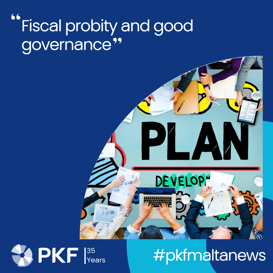Fiscal probity and good governance
Author: George Mangion - Senior Partner at PKF Malta
Published on Malta business weekly: 8th February 2024

Reading articles this winter, readers are presented with images of congested roads and heavy traffic, a situation Castille attributes to the issue of regular permits for street closures during festas.
Following the chill of winter, minds turn to the delicate balancing act that our finance minister has to fight as inflation has amassed an extra two billion euros in debt incurred during the past pandemic years. Let us discuss the “elephant in the room”, that is the surging inflationary forces that are raiding our economy. The Times editor praises the government for doing the right thing in protecting families and businesses from the immediate impact of rising fuel, energy and cereal imports by subsidising these essential materials.
Very wisely, the editorial reminds plebs that one-off subsidies are not a silver bullet. The text book solution of throwing good money after bad can only last so long. What goes up must eventually come down. The IMF has warned us to drop such indiscriminate subsidies and start repaying national debt.
Again, capping energy costs means wastage is encouraged and the rich are subsidised equally as the sans-culottes. It is true that the labour market points to full employment but are we drilling down to eliminate cases of precariat with young families and TCNs working three jobs just to survive till the next monthly cheque?
The cost of dining out has risen and many remark how families are paying double the VAT on dining compared to the amount charged in Europe. Still Castille refuses to eliminate an annual €40m tax on Cola subsidies but forged ahead with a Stability scheme for importers/shops to reduce 15 brand items by 15%. Using a band aid approach to camouflage fuel and grains inflation is the preferred and only tactic so far. The minister of finance has understandably instructed all ministries to start looking for savings on public expenditure.
The man in the street, who travelled for holidays, is conscious that petrol/diesel charged at the pumps are double the rate we pay today. One hopes that the minister of finance will listen and recalibrate his fiscal tactics to ensure taxpayers’ money is used judiciously to spread the trickle-down effect of millions being harnessed by speculators in construction. Consider the scene of easy tax money collected by notaries registering a ballooning number of property deals (although a drop in konvenji [promises of sale] is reported).
Pray, be kind to us and spare us the usual rhetoric on what needs to be done in the year ahead to balance the deficit, encourage economic growth and deal with the net zero drive by 2050. Perhaps banks also need to slack their stiff risk averse attitude (especially now that they are reaping super profits).
Otherwise, we must address environmental degradation, avoid the easy solution of reducing the cost of production by licensing temping agencies – these have discovered their honey jar by importing unskilled labourers from low-cost countries. Still, nobody bothered about a splurge of tax payers’ monies during the pandemic jamboree to generously fund 100,000 unemployed, yet, following the 2022 landslide election, Castille discovered an enigma – a mysterious shortage of skilled workers.
A recent analysis by the Central Bank of Malta talks of an economy that is happily sailing away in choppy waters. It is steady as she goes. Could the enigma of an economy happily firing on all cylinders, enjoying full employment (and a scarcity of workers and 8,100 jobless as per Labour Force Survey) be solved if one examines the strength of a burgeoning shadow economy? This activity, which averages about 26% negatively, affects economic growth in Malta and left unchecked, the underground economy would erode people’s faith in the integrity and fairness of tax system, undermine the competitiveness of honest businesses, as well as cause honest taxpayers to bear the load of those who gain from money-laundering, six figure salaries to party loyalists and indiscriminate issues of direct orders.
Activities in the hidden sector include skimming, unreported construction-related activities, undisclosed rental income and unreported trade-related activity. Needless to observe how our shadow economy is more active than the ones of Greece or Italy. Readers ask how can a country which prides itself of having been recently lifted from the grey list, still harbour such a high percentage of shadow activities. Just contemplate on the example given by top members of Cabinet, resolute not to declare their tax returns.
This speaks volumes of the lackadaisical attitude of the transparency and governance regime reigning in Parliament. Moving on, the finance minister gallantly hopes to fill the coffers by fighting the underground economy and targeting VAT dodgers. The truth is that this year, the government faces a Herculean task to collect arrears of income tax, VAT or stamp duty because loopholes are wide and millions are time-barred.
Author: George Mangion - Senior Partner at PKF Malta
Published on Malta business weekly: 8th February 2024
